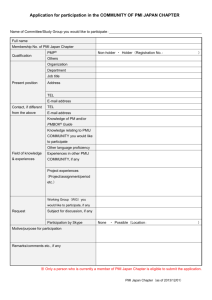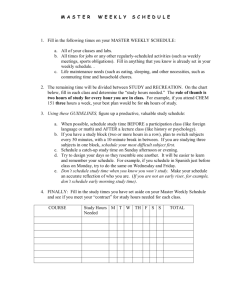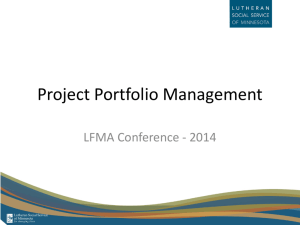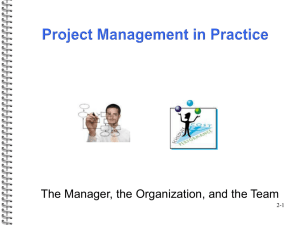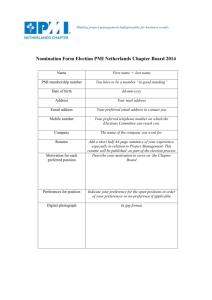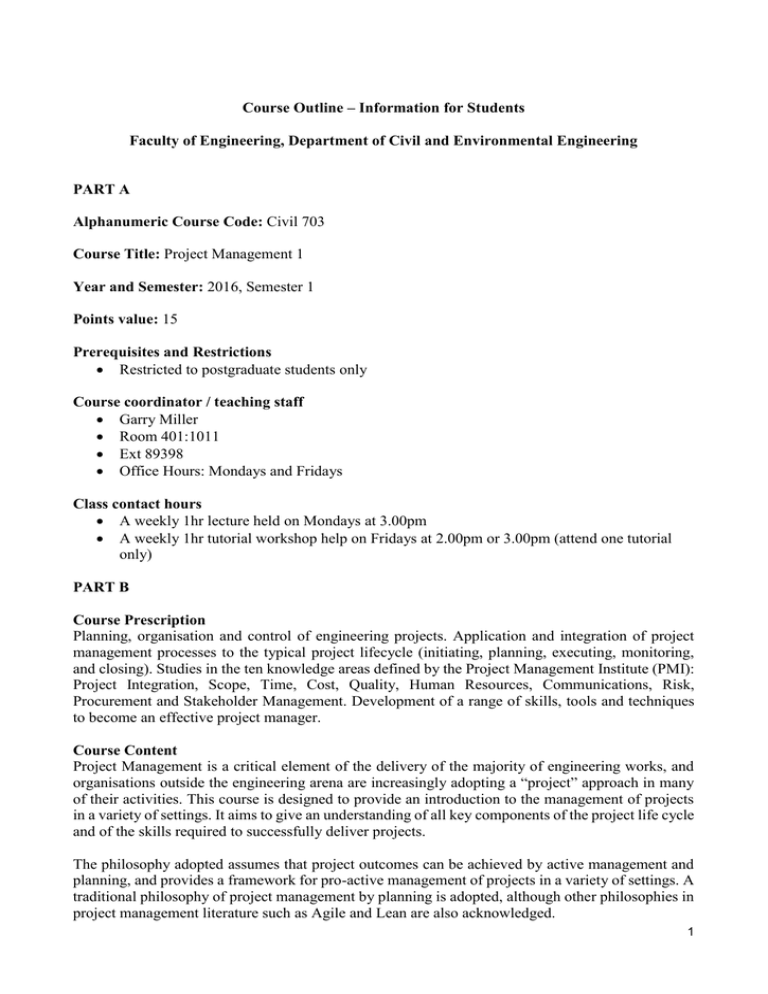
Course Outline – Information for Students
Faculty of Engineering, Department of Civil and Environmental Engineering
PART A
Alphanumeric Course Code: Civil 703
Course Title: Project Management 1
Year and Semester: 2016, Semester 1
Points value: 15
Prerequisites and Restrictions
Restricted to postgraduate students only
Course coordinator / teaching staff
Garry Miller
Room 401:1011
Ext 89398
Office Hours: Mondays and Fridays
Class contact hours
A weekly 1hr lecture held on Mondays at 3.00pm
A weekly 1hr tutorial workshop help on Fridays at 2.00pm or 3.00pm (attend one tutorial
only)
PART B
Course Prescription
Planning, organisation and control of engineering projects. Application and integration of project
management processes to the typical project lifecycle (initiating, planning, executing, monitoring,
and closing). Studies in the ten knowledge areas defined by the Project Management Institute (PMI):
Project Integration, Scope, Time, Cost, Quality, Human Resources, Communications, Risk,
Procurement and Stakeholder Management. Development of a range of skills, tools and techniques
to become an effective project manager.
Course Content
Project Management is a critical element of the delivery of the majority of engineering works, and
organisations outside the engineering arena are increasingly adopting a “project” approach in many
of their activities. This course is designed to provide an introduction to the management of projects
in a variety of settings. It aims to give an understanding of all key components of the project life cycle
and of the skills required to successfully deliver projects.
The philosophy adopted assumes that project outcomes can be achieved by active management and
planning, and provides a framework for pro-active management of projects in a variety of settings. A
traditional philosophy of project management by planning is adopted, although other philosophies in
project management literature such as Agile and Lean are also acknowledged.
1
The paper will have a total of 12 lectures, delivered weekly on Mondays. The weekly topics covered
in the lectures are as follows (note that the order in which topics are delivered may change):
1. Introduction to Project Management
2. Project Lifecycle and Organisation
3. Project Scope Management
4. Project Time Management
5. Project Cost Management
6. Project Quality Management
7. Project Human Resource Management
8. Project Communication Management
9. Project Risk Management
10. Project Procurement Management
11. Project Stakeholder Management
12. Project Integration Management
In addition there is a weekly tutorial on Fridays, which is participatory workshop in which students
are expected to contribute to case studies and actively participate in the application of theories to
problems and workshop scenarios. One of these tutorials will be devoted to Microsoft Project
software.
The course delivery adopts a flexible learning approach in which materials are delivered via a mix of
face-to-face and online methods. As such attendance at lectures and tutorials is not mandatory, (but
is still encouraged).
Students are expected to undertake considerable additional work per week reading and completing
assignments. Note that one of the major assignments is team-based and as such students are expected
to make time to meet with their team members.
Learning Objectives/Outcomes
Upon successful completion of this course, students should be able to:
Understand the fundamentals of project management;
Identify and manage factors that influence the successful outcome of projects;
To be able to analyse and assess the project management needs of organisations;
Understand and apply a range of project management theories, approaches, tools and
techniques;
Undertake the role of a Project Manager and/or a key project role.
Learning resources
There are no prescribed texts. Students may find a number of texts that cover the course material well,
and should refer to several where possible. The following texts are suggested:
PMI, A guide to the Project Management Body of Knowledge (BMBoK Guide), 5th Edition
(2013) (available as free electronic resource for student members of PMI)
PMI, A guide to the Project Management Body of Knowledge (BMBoK Guide), 4th Edition
(2008) (available as electronic resource from University of Auckland library)
Pinto, J.K. (2012) Project Management International Edition, Third Edition, Pearson Prentice
Hall
Meredith, J.R. and Mantel, S. J., Jr. (2011) Project Management: A Managerial Approach,
8th Edition, John Wiley & Sons.
Kerzner H. (2013) Project Management: A systems Approach to Planning, Scheduling, and
Controlling, 11th Edition, Van Nostrand Reinhold.
2
Lecture notes and lecture voice recordings are available on Canvas and a course related website. Some
other additional materials such as templates are also available on the course website. Microsoft
Project software is available on the lab computers in the Faculty of Engineering.
Inclusive learning
Students are urged to discuss privately any impairment-related requirements face-to-face and/or in
written form with the course convenor/lecturer and/or tutor.
Other information
The team assignment requires that students work in small-medium sized teams on a major assignment.
Participation in the team assignment is required (there is no alternative assignment option for students
who prefer not to work in teams). The expectation is that the team a self-managing autonomous unit,
and is used as a learning environment on the basis that projects are typically delivered in teams in the
workplace.
A group mark will be given for the team assignment deliverables. Each team member will also be
required to complete a peer assessment of the work attitudes and contributions of all other members
of their team The individual student’s mark will then be determined based on the group mark, adjusted
up or down within a range of about about + or - 15%, in accordance with the results of the peer
assessment by all other members of the team. Note also that your team assignment mark may be
reduced substantially more if there is evidence that you have not contributed to the team assignment,
and zero participation in the team assignment will result in a zero mark of the project.
PART C
Assessment
There are 4 assignments totalling 100% of the course assessment:
Individual research-based essay (10%)
Individual assignment (40%)
Individual critical reflections (3 number) (10%)
Team assignment (40%)
There is no exam.
A provisional schedule of deadlines is as follows (subject to confirmation in week 1):
Individual research-based essay (10%) – week 3
Individual assignment (40%) – week 6
Individual critical reflections (10%) – weeks 4, 8 and 12
Team assignment (40%) – week 11
Penalties will apply to late submissions as follows:
Time After the Due Date
<=24 hours (1 day)
>24 hours but <=48 hours (2 days)
>48 hours but <=72 hours (3 days)
>72 hours but <=96 hours (4 days)
>96 hours but <=168 hours (7 days)
>168 hours (7 days)
Penalty
-10%
-20%
-30%
-40%
-50%
-100%
3
Extensions will only be granted in exceptional circumstances. If you want to apply for an extension
you should discuss your circumstances with the Course Coordinator before the assignment due date.
For medical circumstances, you should provide a copy (or original) of a medical certificate.
Academic Integrity
The University of Auckland will not tolerate cheating, or assisting others to cheat, and views
cheating in coursework as a serious academic offence. The work that a student submits for
grading must be the student's own work, reflecting his or her learning. Where work from other
sources is used, it must be properly acknowledged and referenced. This requirement also applies
to sources on the world-wide web. A student's assessed work may be reviewed against electronic
source material using computerised detection mechanisms. Upon reasonable request, students
may be required to provide an electronic version of their work for computerised review.
In the event of an unexpected disruption
We undertake to maintain the continuity and standard of teaching and learning in all your courses
throughout the year. If there are unexpected disruptions the University has contingency plans to
ensure that access to your course continues and your assessment is fair, and not compromised.
Some adjustments may need to be made in emergencies. You will be kept fully informed by your
course co-ordinator, and if disruption occurs you should refer to the University Website for
information about how to proceed.
PART D
Student feedback
Student feedback is welcomed in order to help with continuous improvement of the course. In the
past feedback has been obtained from students to help develop the course website and to modify
delivery methods to a more flexible mode. To help in future you may be asked to course evaluations
and / or formative mid course evaluations/ fast feedback.
4


